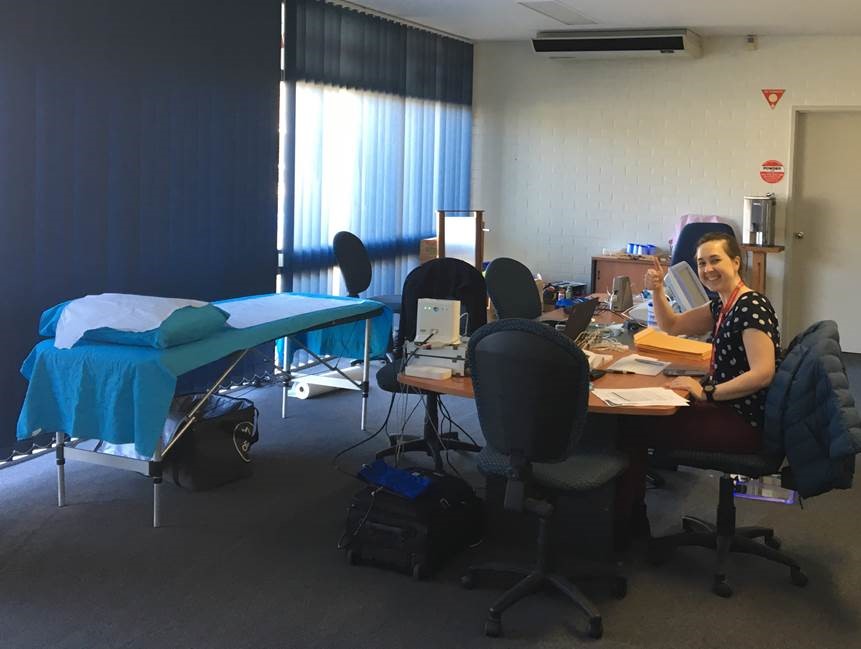Healthy hearts for an overlooked group

Dr Clara Zwack worked from a Yooralla Business Enterprise to collect and analyse participant health data
In summary
- This Swinburne-led research works with health providers to improve the health and wellbeing outcomes for young people with an intellectual disability
- The research has undertaken the largest data collection of young people with an intellectual disability in Australia
- Young people with an intellectual disability have a high risk of heart disease and early death
The largest study to collect heart health data from young Australians with an intellectual disability has inspired new findings on how to minimise health inequities.
Young people with intellectual disabilities are woefully understudied. Because the research can be difficult – there are challenges with recruitment and getting consent – retrospective data is often used, or even results from a broader demographic of people with disability.
Enter Swinburne researcher Dr Clara Zwack, who was inspired to embark on a PhD exploring screening for risk factors in this group to improve their health and wellbeing outcomes and help minimise health inequities. She was supervised by an Iverson Health Innovation Research Institute team – nursing clinician, researcher and lecturer Professor Rachael McDonald and expert in cardiometabolic diseases Associate Professor Elisabeth Lambert – and worked in tandem with industry partners Yooralla and Goulburn Options in Seymour.
They found that young people with an intellectual disability have a high risk of heart disease, which may be leading to early death.
There are many factors contributing to this statistic, including lower levels of physical activity, not participating in organised activity, poor diet, lacking basic health knowledge and higher levels of stress.
The good news? With better awareness and support from health professionals, early detection and prevention of health issues for 18- to 45-year-olds with intellectual disabilities could save lives.
Dr Zwack says stress and anxiety is not commonly considered in this population. Building interventions to start addressing these issues could make a significant difference.
“Knowing about these risk factors means that we can create user-centred and user-led interventions, including digital interventions, physical interventions and ensure mainstream disability services are aware of the exclusion.
“People with intellectual disabilities were being seen by health professionals, but these issues weren’t being detected,” said Dr Zwack.
Early intervention could improve the health of young people with an intellectual disability later on in their lives, it’s more cost effective and it can reduce risk of early death.
The team have recommended additional measures be applied to young people with an intellectual disability so cardiovascular health issues are identified. For example, regular blood checks wouldn’t usually occur for a 20-year-old, but are warranted for a 20-year-old with an intellectual disability.
“Having a profile for a demographic like this one allows health professionals to develop and use targeted and more effective diagnostic measures,” said Dr Zwack.
The researchers found a community keen to volunteer for the study, with strong connections to their health providers.
“People with intellectual disabilities are passionate about their own health and do want to live a healthy life. They know and understand their own health and they want to be as healthy as possible, but need support that health professionals are not providing at the moment,” Dr Zwack says.
“A multidisciplinary team is needed to solve complex problems and issues. No single profession can address the complexity here.”
-
Media Enquiries
Related articles
-

- Technology
- Health
New MedTechVic prototypes to transform everyday lives of people with a disability
Swinburne’s MedTechVic has revealed three new prototypes designed through the joint Health-led Manufacturing Innovation Program, in partnership with the Australian Medtech Manufacturing Centre and Safer Care Victoria
Friday 19 July 2024 -

- Health
- Education
Dissociation is a common trauma response among many who seek therapy, but only one in five psychologists can accurately identify symptoms
New Swinburne research has found that four in five Australian psychologists have gaps in their knowledge on dissociation and cannot accurately identify dissociation symptoms.
Friday 21 June 2024 -

- Health
- Technology
Clinical Innovation Fellowships develop creative solutions to Australia’s healthcare challenges
MedTechVic is gearing up to begin its fourth year of the Clinical Innovation Fellowship Program (CIFP), following the highly successful third round in 2023.
Wednesday 19 June 2024 -

- Social Affairs
- Health
Swinburne leads world-first medical cannabis driving trial
Swinburne researchers are spearheading a world-first trial to evaluate whether patients can drive safely while on prescribed medical cannabis
Tuesday 28 May 2024 -

- Technology
- Health
MChart redefines mental health service planning through cutting-edge data analytics
MChart, a new tool under development by Swinburne University of Technology and University of Canberra researchers, is set to help health care providers navigate the complexities of mental health service planning using data analytics and geospatial mapping.
Monday 13 May 2024

